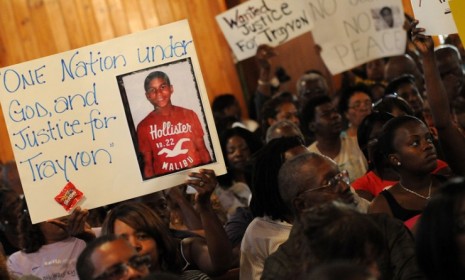Trayvon Martin's death: 4 lessons about race in America
The unarmed black Florida teen was shot dead by a half-Hispanic neighborhood vigilante. Is being black in America inherently dangerous?

A free daily email with the biggest news stories of the day – and the best features from TheWeek.com
You are now subscribed
Your newsletter sign-up was successful
The tragic shooting death of 17-year-old Trayvon Martin has sparked outrage nationwide, and as more details about the killing emerge, it's hard to look at the case without considering race. Martin, who was black and unarmed, was slain by an evidently overzealous, self-appointed neighborhood watchman, George Zimmerman, with a history of calling 911 about "suspicious" black guys in the Orlando-area gated community where he lives and Martin was staying. The local police accepted Zimmerman's self-defense claim with apparently only a cursory investigation, and the half-white, half-Hispanic 28-year-old shooter has still not been arrested, though now the feds are investigating. What does this story tell us about race in America? Here, four lessons:
1. Sadly, being black in America is still dangerous
Martin's killing is a stark reminder that even today, "one of the burdens of being a black male is carrying the heavy weight of other people's suspicions," says Jonathan Capehart in The Washington Post. "One minute you're going about your life, the next you could be pleading for it, if you're lucky." Martin wasn't, and that "has black parents around the country clutching their sons a little closer." More frightening still, says Christy Oglesby at CNN, is that Martin followed the rules we black mothers tell our sons to keep them alive: Look sharp, avoid trouble, don't ever run in public. I'm sure some readers "just sucked their teeth in disgusted disbelief and decided that I'm exaggerating.... I'm not. If I were, Trayvon would be alive."
The Week
Escape your echo chamber. Get the facts behind the news, plus analysis from multiple perspectives.

Sign up for The Week's Free Newsletters
From our morning news briefing to a weekly Good News Newsletter, get the best of The Week delivered directly to your inbox.
From our morning news briefing to a weekly Good News Newsletter, get the best of The Week delivered directly to your inbox.
2. The Left still uses race as a political weapon
"The media feeding frenzy over this particular story — one out of the thousands of homicides in this country —" is driven by a "left-wing campaign to keep" the divisive tale in the headlines, says Dan McLaughlin at RedState. Liberal activists cynically believe they'll benefit politically by inflaming "racial division in an election year," using the Trayvon Martin case to "provide a backdrop of racial strife" that will theoretically fire up the base. But more often, ginning up race-related outrage just leads to "riots that leave people dead or homeless and local businesses and jobs destroyed."
3. Racial bias and lax gun laws are a deadly combination
This story isn't just about race, says Ta-Nehisi Coates at The Atlantic. "This is about race along with" Florida's "absurdly low threshold for self-defense claims" in homicides. The Sunshine State's 2005 "Stand Your Ground" law allows permitted gun owners like Zimmerman to use lethal force on anybody if they reasonably believe it will prevent grave injury or death. And because of our enduring biases, "black people bear a spectacular burden for" such "bad public policy." Indeed, it's not enough to blame the "racist criminal" in this case," says Michael Coard at The Philly Post. We have to blame the "racist criminal system," too, for its bigot-empowering "shoot 'em up" law.
A free daily email with the biggest news stories of the day – and the best features from TheWeek.com
4. None of us are without bias
We're all at least a little bit racist, University of Chicago psychology professor Joshua Correll tells NPR. For years, Correll has studied bias against black men, and has found that people "are universally more likely to fire at black men — whether the shooter is young, old, male, female, or even black," say Eyder Peralta and Mark Memmott at NPR. In Correll's studies, people play a game in which they have two buttons: "Shoot or don't shoot." They're shown pictures of black men and white men, some carrying guns, others holding run-of-the-mill items like cellphones. "The point is to shoot the guys with guns." But Correll discovered that across the board, shooters are "more likely to fire at an unarmed black man" and "less likely to shoot an armed white man."
-
 What to know before filing your own taxes for the first time
What to know before filing your own taxes for the first timethe explainer Tackle this financial milestone with confidence
-
 The biggest box office flops of the 21st century
The biggest box office flops of the 21st centuryin depth Unnecessary remakes and turgid, expensive CGI-fests highlight this list of these most notorious box-office losers
-
 What are the best investments for beginners?
What are the best investments for beginners?The Explainer Stocks and ETFs and bonds, oh my